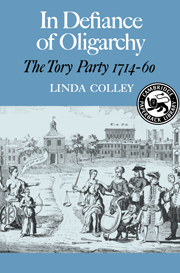2 - The Tory Response to Proscription
Published online by Cambridge University Press: 03 February 2010
Summary
Horace Walpole, who was even more adept than Lord Hervey at writing Old Corps whig propaganda in the guise of history, argued that the Hanoverian Succession left the tory party with three options: ‘In truth, all sensible Tories I ever knew were either Jacobites or became Whigs; those that remained Tories remained fools.’ His verdict is still current. Until recently it was assumed that talented and ambitious tories responded to proscription by defecting to the whigs, and so reduced their original party to a rump of fiercely independent country gentlemen analogous to the tory remnant of 1847. As the post-1714 tory residuum lacked a Disraeli and was incapable of efficient parliamentary opposition, it provided for the emergence of an opulent and immune whig supremacy; it also rendered the well-defined political parties and binary party conflict of the Augustan era obsolete. The whig ministers of the mid eighteenth century - Lord Stanhope, Sir Robert Walpole, Henry Pelham, and the duke of Newcastle - could be assailed only by whig dissidents - men whose opportunism was bound to corrode their party's sense of a collective identity, but who could usually be bought off by state employment if they proved too disruptive.
This presentation of tory dissolution and its related insistence on the a-party nature of early Georgian politics have been challenged by Eveline Cruickshanks, Paul Fritz, and, more subtly, by J. C. D. Clark. The tories, it is now supposed, remained sufficiently careerist to want to regain state office.
- Type
- Chapter
- Information
- In Defiance of OligarchyThe Tory Party 1714-60, pp. 25 - 50Publisher: Cambridge University PressPrint publication year: 1982



